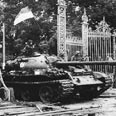
From Saigon to Beirut
The United States could allow itself to lose in Vietnam. Israel has no such luxury in Lebanon
In January, 1968 there were 500,000 American soldiers in Vietnam. January 30 was "Tet", the Vietnamese lunar new year, and on that day the inferno began: Thousands of Vietcong soldiers attacked US army installments, villages and towns deep in South Vietnam, an the US embassy in Saigon, the capital of South Vietnam, in a classic suicide mission.
Thus began the infamous Tet Offensive that would eventually tip the scales in the Vietnam War. Not because the Vietcong won on the battlefield, but rather because it was burned into the American consciousness that they did.
In fact, as historian Barbara Tuchman explains in "March of Folly," the Vietcong suffered a terrible military loss in the Tet Offensive. Some 50,000 guerillas were killed, the group failed to hold even one area they had previously controlled (not even the US embassy, which was saved by eight Marine deaths), and they murdered thousands of civilians as they retreated.
The Vietcong "had failed to hold a single city and had lost about half its fighting force. With seven more years of fighting, the guerilla fighters of the Vietcong never again played a leading role because they had been so diminished in the Tet Offensive," giving way instead to regular units of the North Vietnam Army, writes Mark Kurlanski in his new book, "1968."
Victory in battle, failure in PR
Despite the victory on the battlefield, the Americans lost the Tet Offensive. This was partly due to arrogant generals who claimed the United States was on the threshold of victory and needed just a "few more" soldiers and bombs to bring the war to a close.
It was partly due to members of the Democratic Party, starting with President Lyndon Johnson, who responded to the offensive in the worst possible way: a partial unilateral ceasefire.
And the media, too, contributed to the loss: Until Tet, the media had held on to a myth of the ever-victorious army. Now, all of a sudden, journalists found themselves reporting in a panic from the fields of destruction, in real time, about casualties, burnt bodies, injuries and brave Vietcong soldiers.
More than anything, the late CBS anchorman Walter Cronkite's special reports had a far-reaching affect on the American mindset. After traveling to Vietnam, he came back with a clear message for American viewers: America was not winning in Vietnam, and not losing. Therefore, the US must negotiate with the Communist armies.
The rest, as they say, is history. The ceasefire was taken by the Communists as a huge victory, and by mid-1968 the Americans had begun reducing troop presence to symbolic levels.
In presidential elections that November the Democratic left was trounced, and Republican Richard Nixon was elected. Negotiations with North Vietnam encountered many crises and eventually the United States was forced to accept a humiliating deal.
Local example
On July 12, 2006, Hizbullah began its "Tet Offensive" on the northern border. The group had been planning the attack for years, training and gaining strength. It has acquired modern weapons, created a communications network, and become, from its perspective, the best regular army for an offensive war against Israel and for ongoing fighting.
At the same time, Israel has started to lose the second Lebanon War, both in terms of local perception and Arab and international consciousness.
In order to ensure that July, 2006 does not become for Israel what January, 1968 was for the Americans, Israel must undergo immediate political change. Guilty or not, there is no choice but to replace the current government, and no choice but to establish a commission of inquiry.
Olmert and Peretz have lost the support of the public. They are seen as lost, with a mark of Cain emblazoned on their foreheads. Isolated military actions here and there will not get back Israel's credibility, power of deterrence, or standing. It will take a different government to achieve those things.
Hizbullah is not the Viecong. The United States does not share a border with Vietnam, and its military presence there was a mistake to begin with. America had the luxury to allow itself to be beaten in the Tet Offensive. We have no such luxury.










